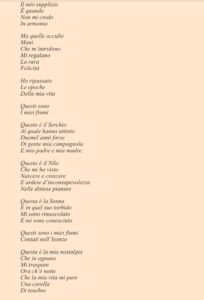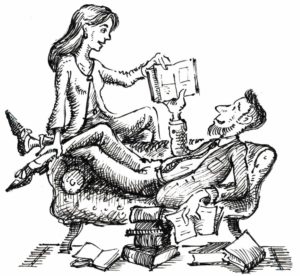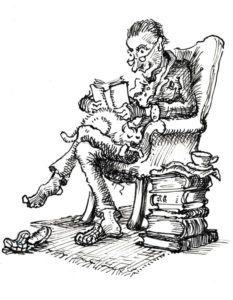Ungaretti’s Typewriter
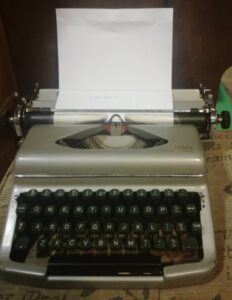 AN ADDITION TO THE shop landscape: Ungaretti’s Typewriter. Customers (all two of them) are invited to type upon it any random thought, flow of consciousness dribble, abstract or recited prose or poetry, scat porn or holy doodle, A4 paper provided at no cost. Its resultant screed might even be published. Its tab-stop is set to allow only a small column of type, hence its name.
AN ADDITION TO THE shop landscape: Ungaretti’s Typewriter. Customers (all two of them) are invited to type upon it any random thought, flow of consciousness dribble, abstract or recited prose or poetry, scat porn or holy doodle, A4 paper provided at no cost. Its resultant screed might even be published. Its tab-stop is set to allow only a small column of type, hence its name.
The typewriter is named after Giuseppe Ungaretti, an Italian modernist poet, whose poems rarely had much flesh – a few, brief lines was typical -. but nearly always musical and rhythmic, held as both exquisite and emotional by one enthusiastic Italian friend. This friend insists also that Ungaretti should have won the Nobel Prize. I am not an Italian speaker, so in translation I never got the entirety of each poem’s delicacy. However, each brief poem with these short lines must have taken Ungaretti ages, at least five minutes, lazy sod. Or perhaps his pith was encouraged by a typewriter with a broken tab-stop. Hence my ROYAL typewriter, manufactured by Diana Schreib-Maschinenf Abrik in Mannheim, subsidiary of the McBee Corporation of New York. Its green keys sit invitingly, but I’ve buggered up its stop-tab to forbid lengthy lines and to flush out brevity.
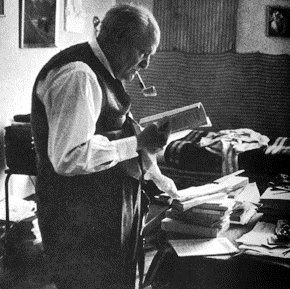 Born in Egypt, 1888, his family from Tuscany, his childhood nurse Nubian, schooled in French by Swiss teachers, schizophrenic in his belief (one minute Catholic, the next atheist, so on), a topsy turvy anarchist, Ungaretti met and was influenced by Bergson and Apollinaire when at university in Paris. This scrimmage of temperament and identity settled on Italian nationalism. He enlisted in the First World War only to discover he was actually quite bad at fighting; poetry had been always much more to his taste. He turned to Dada with gusto whilst working as a journalist in Paris. This was in fact only his latest craze: he’d done symbolism and Parnassianism already, flirted with socialism and hung out with the Futurists. A subsequent enthusiasm for Il Duce was a safe bet. By the early 1920s his political stock was invested heavily in Mussolini. Ungaretti’s clarion call to literary arms – “this people hungers for poetry” – met with favour, and he helped to shape the Italian Academy with Fascist contours. Mussolini even wrote the introduction to a 1923 reprint of Il porto sepolto, his first collection of free verse. Fed up with his artistic meanderings, he settled on an invented, junk poetic style of Hermeticism, which allowed him to do away with punctuation, form and syntax – anything that got in the way of poetic laziness, I suppose. Financial despair pushed him to Brazil where he sat out the first years of the Second World War.
Born in Egypt, 1888, his family from Tuscany, his childhood nurse Nubian, schooled in French by Swiss teachers, schizophrenic in his belief (one minute Catholic, the next atheist, so on), a topsy turvy anarchist, Ungaretti met and was influenced by Bergson and Apollinaire when at university in Paris. This scrimmage of temperament and identity settled on Italian nationalism. He enlisted in the First World War only to discover he was actually quite bad at fighting; poetry had been always much more to his taste. He turned to Dada with gusto whilst working as a journalist in Paris. This was in fact only his latest craze: he’d done symbolism and Parnassianism already, flirted with socialism and hung out with the Futurists. A subsequent enthusiasm for Il Duce was a safe bet. By the early 1920s his political stock was invested heavily in Mussolini. Ungaretti’s clarion call to literary arms – “this people hungers for poetry” – met with favour, and he helped to shape the Italian Academy with Fascist contours. Mussolini even wrote the introduction to a 1923 reprint of Il porto sepolto, his first collection of free verse. Fed up with his artistic meanderings, he settled on an invented, junk poetic style of Hermeticism, which allowed him to do away with punctuation, form and syntax – anything that got in the way of poetic laziness, I suppose. Financial despair pushed him to Brazil where he sat out the first years of the Second World War.
Returned to Italy and feted in 1943, his poetry became more formal. Poets too can collapse into conservatism and a more formal style, just as youthful alternative comedians and left wingers do. Ungaretti also was in part forgiven his previous Fascist bite. Or at least he ducked and dived, and he was able to travel the world with success.
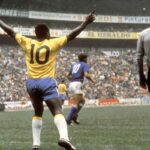 Ungaretti’s prominence never coincided with Italy’s turn for the Nobel Prize. But Italy continued to place well in the football, though they lost the World Cup final in the month and year Ungaretti died, June 1970. Brazil who won that year, Jairzinho and Pele rampant. I watched it: 4-1.
Ungaretti’s prominence never coincided with Italy’s turn for the Nobel Prize. But Italy continued to place well in the football, though they lost the World Cup final in the month and year Ungaretti died, June 1970. Brazil who won that year, Jairzinho and Pele rampant. I watched it: 4-1.
